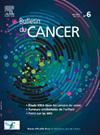Cancer et prise en charge nutritionnelle du surpoids et de l’obésité : évaluation de pratique
IF 1.1
4区 医学
Q4 ONCOLOGY
引用次数: 0
Abstract
Contexte
Cette analyse de pratique visait à évaluer l’évolution pondérale pendant et après une intervention nutritionnelle chez des patients atteints de cancer.
Méthode
Cette étude rétrospective a été menée entre janvier 2014 et octobre 2020 chez des patients majeurs atteints de tous types de cancers, pris en charge au Centre Léon-Bérard, en cours de traitement ou en suivi post-thérapeutique, ayant un indice de masse corporelle (IMC) ≥ 25 kg/m2 et ayant bénéficié d’au moins trois consultations avec un médecin nutritionniste. La prise en charge était axée sur les dimensions comportementales, métaboliques et nutritionnelles, et comportait un suivi de l’évolution anthropométrique des patients, tels que tour de taille, poids et IMC. L’objectif était d’évaluer l’impact de cette intervention nutritionnelle sur l’évolution des paramètres anthropométriques chez ces patients.
Résultats
Au total, 247 patients ont été inclus dans l’analyse. La durée médiane de suivi nutritionnel était de 7,2 mois. Entre la première et la dernière consultation de nutrition, le tour de taille a diminué pour 97,2 % des patients, avec une médiane de dix centimètres. Le poids et l’IMC ont diminué chez 85,0 % et 83,8 % des patients, respectivement. Six mois après la fin du suivi, 53,7 % des patients avaient un poids stable ou en baisse.
Conclusion
Cette analyse de pratique montre l’intérêt d’une consultation nutritionnelle pendant les traitements du cancer pour l’amélioration des paramètres anthropométriques au cours de la prise en charge ainsi qu’une stabilisation ou un maintien de la perte à distance de la prise en charge pour la moitié des patients.
Context
The aim of this practice evaluation was to assess weight trends during and after a nutritional intervention in cancer patients and survivors.
Methods
This retrospective study was conducted between January 2014 and October 2020 in adults with different cancer types managed at the Léon-Bérard Cancer Center, undergoing treatment or during post-treatment follow-up, with a BMI ≥ 25 kg/m2 and who had at least 3 consultations with a nutrition physician. Nutritional management focused on behavioral, metabolic and nutritional aspects. Anthropometrics measurements, i.e., waist circumference, weight and BMI, were monitored prospectively during the nutritional consultation. The aim of this study was to evaluate the impact of the nutritional intervention on the anthropometrics measurements.
Results
Overall, 247 patients were included in the analysis. The median duration of the nutritional intervention was 7.2 months. Between the first and the last nutrition consultation, waist circumference was reduced in 97.2% of the patients, with a median loss of 10 cm; weight and BMI were reduced in 85.0% and 83.8% of the patients respectively. Six months after the end of the nutritional intervention, 53.7% of patients had stable or continued reduced weight.
Conclusion
This analysis of practice shows the positive impact of a nutritional intervention during cancer treatments on anthropometric parameters, and maintenance or continued weight loss at distance from the intervention in half of the patients.
[癌症与超重和肥胖的营养管理:实践评价]。
背景:本实践评估的目的是评估癌症患者和幸存者在营养干预期间和之后的体重趋势。方法:本回顾性研究于2014年1月至2020年10月期间在lsamo - bsamo癌症中心进行,患者患有不同类型的癌症,正在接受治疗或治疗后随访,BMI≥25kg/m2,并至少与营养医生进行过3次咨询。营养管理侧重于行为、代谢和营养方面。在营养咨询期间,对人体测量测量,即腰围、体重和BMI进行前瞻性监测。本研究的目的是评估营养干预对人体测量的影响。结果:共纳入247例患者。营养干预的中位持续时间为7.2个月。在第一次和最后一次营养咨询之间,97.2%的患者腰围减少,中位数减少10cm;患者体重和BMI分别下降85.0%和83.8%。营养干预结束6个月后,53.7%的患者体重稳定或持续下降。结论:这一实践分析表明,癌症治疗期间营养干预对人体测量参数的积极影响,以及一半患者在远离干预的情况下维持或持续体重减轻。
本文章由计算机程序翻译,如有差异,请以英文原文为准。
求助全文
约1分钟内获得全文
求助全文
来源期刊

Bulletin Du Cancer
医学-肿瘤学
CiteScore
1.90
自引率
16.70%
发文量
224
审稿时长
37 days
期刊介绍:
Without doubt, the ''Bulletin du Cancer'' is the French language publication of reference in the field of cancerology. Official organ of the French Society of Cancer, this journal covers all the information available, whether in the form of original articles or review articles, but also clinical cases and letters to the editor, including various disciplines as onco-hematology, solids tumors, medical oncology, pharmacology, epidemiology, biology as well as fundamental research in cancerology. The journal proposes a clinical and therapeutic approach of high scientific standard and regular updates in knowledge are thus made possible. Articles can be submitted in French or English.
 求助内容:
求助内容: 应助结果提醒方式:
应助结果提醒方式:


